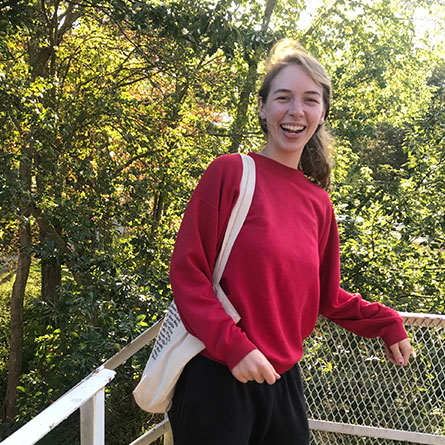
Annette Davis
Berlin, Massachusetts
Anthropology and Hispanic Studies double major
We strongly encourage anthropology majors and minors to enrich their growing anthropological knowledge by participating in study away and internship programs. We believe that study away offers students an opportunity to better understand that people live and experience the world in different ways, whether this is through navigating a foreign university system or buying groceries at a local market. This exposure to different ways of living and imagining the world helps build empathy and an openness to cultural diversity. Students studying away will experience firsthand the ways in which everyday life and routine is mediated by local politics, economics, customs and religion. They also have a unique opportunity to reflect on their own identities and the identities of others in regard to nationality, race, ethnicity, gender and class. In the process, students will develop language skills and solidify their understanding of the relationships between language and culture. Ultimately, students will learn to adjust and adapt to new situations, environments and systems - skills and resourcefulness that will be useful throughout their lives.
Given the intimate link between language and culture, we urge students to connect their first two years of language studies at Connecticut College to their study away experiences. This can be achieved by enrolling in study away programs that offer courses and/or immersive learning experiences in the same language studied at the College.
We think it critically important that our majors and minors rigorously prepare for their study away experiences, but also have opportunity to unpack those experiences when they return. Anthropology majors who plan to study away are required to enroll in ANT297 (2 credits) during the semester prior to studying away, and ANT298 (2 credits) during the semester immediately following their return to Connecticut College. During this proseminar, students who are preparing to study away learn from the experiences of those returning. Combined, the two seminars satisfy one 200-level course or one elective requirement for the major. So as to minimally disrupt academic and co-curricular schedules, these seminars are typically offered on Wednesday evenings (7-9 PM) every other week, for a total of 6-7 meetings in a single semester.
For those who want to study away, we require our majors and minors to develop, with the help of their major advisor, an Academic Justification Statement that provides a rationale for their specific program selection. Criteria for the Academic Justification may include, for example, a program that offers a unique opportunity for language study (including languages that are not taught at Connecticut College); a program that offers courses in areas of anthropology that are not regularly taught at Connecticut College (for example, forensic anthropology, biological anthropology, or courses with a geographic regional focus beyond the expertise of our faculty); or a program that provides instruction in field research methodologies that may contribute to developing a research plan for an Honors Thesis or Senior Integrative Project.
A maximum of two anthropology courses taken during a study away semester can be applied to the major or minor and count toward the archaeology concentration upon approval by the student’s advisors and the Chair of the department.
On return, students must complete a Course Exception Form. Additionally, students must write a one-paragraph justification for why the courses they took should count towards the anthropology major or minor. The justification and the Course Exception Form should be submitted to the student’s adviser for consideration. The student must then take the Course Exception Form to the Chair for approval and then to the Registrar's office.

Berlin, Massachusetts
Anthropology and Hispanic Studies double major
Anthropology Department
Mailing Address
Connecticut College
Anthropology Department
270 Mohegan Ave.
New London, CT 06320
Campus Location
Winthrop House